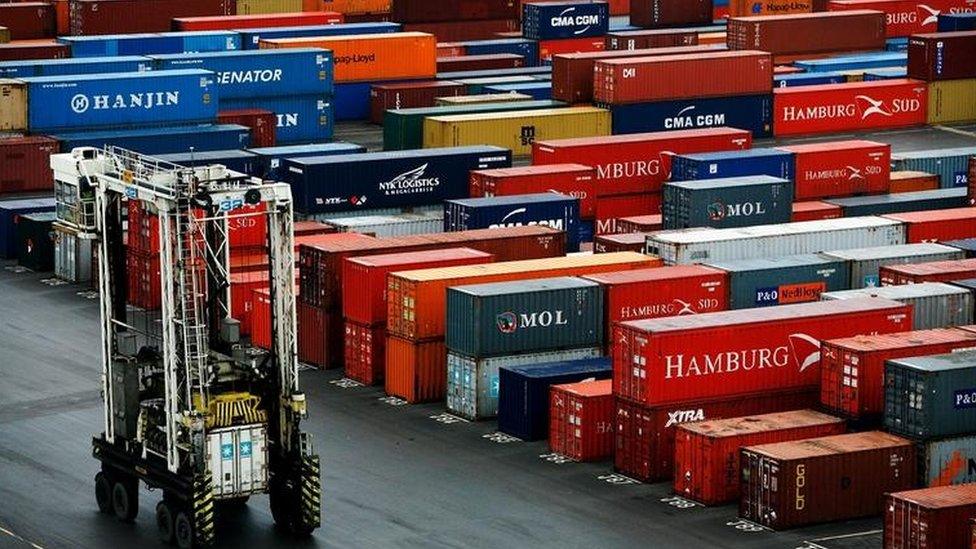Perhaps austerity didn't choke off UK recovery
- Published
- comments

Today we learned that our recent economic past and the almost-present weren't quite as painful as we thought. But what does that mean for our future prosperity?
Perhaps most important, the deficit on our current account - the difference between the money we earn from the rest of the world and what we pay the rest of the world, on trade and investment - narrowed sharply from an unsustainably high 5.2% of GDP in the first three months of the year to 3.6% in the second quarter.
That is the first time in two years that the rate at which we've been shipping in debt from abroad dropped comfortably below 5% of GDP - having widened to a record 6% plus of GDP on a couple of occasions since the middle of 2013.
And what is striking is that the improvement was down to the part of the current account that for the past 30 years has been intractably lacklustre, viz our net sales of goods and services.
What's more, this improvement took place in spite of a strengthening of the pound by almost 6% on a trade-weighted basis in the first half of the year.
In the circumstances of the British economy growing relatively strongly and being powered by consumption, it is intriguing that we didn't suck in more cheap imports - and also that overseas buyers did not apparently regard our exports as poor value for money.
The cheering implication is that there has been more of a revival in the competitiveness of British manufacturing than other official statistics would indicate.
Fingers crossed - though if growth in the rest of the world continues to decelerate, and consumption in the UK does not, this nightingale will not be ushering in spring.

Austerity debate
And another thing: the Office for National Statistics has decided that the economy grew more strongly in the last parliament than it thought.
Now this is very much a mixed blessing for the government.
On the one hand, the argument of the critics of the government - such as the economists Paul Krugman and Simon Wren-Lewis - that George Osborne's austerity choked off economic recovery doesn't look as persuasive as it did.
The ONS today says that the economy grew 1.5% in the general election year of 2010, then 2% after austerity bit in 2011 - revised up by the ONS from 1.6% - and then 1.2% in 2012, when the eurozone's economic crisis imposed maximum pain on us.
The previous picture, of austerity reducing growth from 1.9% in 2010, to 1.6% in 2011, to 0.7% in 2012, has been magicked away by the official statisticians.
And they have also revised up their estimate of growth for 2013 from 1.7% to 2.2%.
Anyway, if these statistics are more reliable than the last lot, a particular school of Keynesian economists may choose to re-examine their contention that only a fool or a liar would say there is a legitimate debate about whether George Osborne's policies were good or bad for the recovery.
And if you think economic performance determines general elections, voters may not have been mad or irrational to vote Tory.
But, as I mentioned, the disclosure that we were a bit richer in the last parliament than we thought is not all fabulous news for the chancellor.
He and his Treasury colleagues should probably be anxious that the faster growth did not translate into higher tax revenues.
In case you need reminding, George Osborne singularly failed to hit the deficit reduction targets he set himself. But the explanation can no longer be that the economy flatlined, because that's not what happened.
So if the higher-than-thought growth in the last parliament left the gap between government revenues and expenditures tens of billions of pounds greater than George Osborne hoped, it also suggests that his aspiration of eliminating the deficit in this parliament may prove equally elusive.